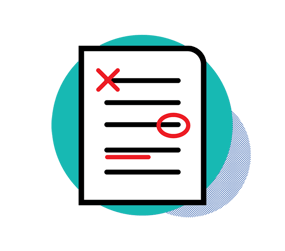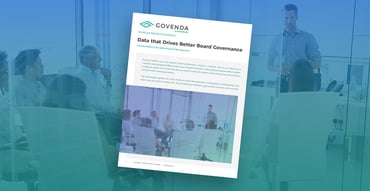 In the wake of data breaches worldwide, consumers are more focused on their data than ever before. While C-suite executives are often seen as the face of a company, the way boards of directors are handling data governance is in the spotlight. The Eckerson Group reports that nearly 5 million data records are lost or stolen every day. “Data ethics is the huge and hazardous mass hidden beneath the surface,” continues Eckerson. “We need clear, non-ambiguous principles and practices that drive honest, honorable, and appropriate behaviors when working with data. It is time to step up to data ethics, and data governance must take the lead.” Data governance is an important part of corporate governance best practices as consumers are demanding a greater sense of transparency and are more cognizant of how companies use their data. One way that organizations can combat these issues is implementing a strict and ethically sound data governance framework.
In the wake of data breaches worldwide, consumers are more focused on their data than ever before. While C-suite executives are often seen as the face of a company, the way boards of directors are handling data governance is in the spotlight. The Eckerson Group reports that nearly 5 million data records are lost or stolen every day. “Data ethics is the huge and hazardous mass hidden beneath the surface,” continues Eckerson. “We need clear, non-ambiguous principles and practices that drive honest, honorable, and appropriate behaviors when working with data. It is time to step up to data ethics, and data governance must take the lead.” Data governance is an important part of corporate governance best practices as consumers are demanding a greater sense of transparency and are more cognizant of how companies use their data. One way that organizations can combat these issues is implementing a strict and ethically sound data governance framework.
What is Data Governance?
Data governance is an overarching strategy for organizations to ensure the data they use is clean, accurate, usable, and secure. It also concerns the management and use of data. This applies not only to company data, but data collected by companies from other entities and consumers. Data Governance is increasingly becoming a corporate governance concern. Once only designated to executives and IT professionals, it is important that data interests are explored by the top tier directors on the board. Boards of directors should be aware that data governance also falls under the umbrella of ethics. “It is time to recognize that data ethics is an increasingly important topic of data management and an area where data governance can take a leading role,” explains Eckerson. Enormous quantities of data are retained every day by organizations and a strict data governance framework should be in place to manage and utilize data for the benefit of both organizations and their consumers.
The Board and Data Governance
As the governing body of an organization, the board of directors has the duty to also oversee data governance and ethical usage of that data. “Data itself has no ethical implications. The ethical questions arise from the things that we do (or don’t do) with data- how we collect data, how we protect it, and how we use it,” continues Eckerson. “Collection, protection, and use of data all call for ethical judgments.” Therefore, boards of directors should include data governance in their organizations’ code of ethics. “It is important that these statements and codes exist, but what really counts is having the board and senior management know and buy into them,” says the Journal of Accountancy. The first step in creating a data governance framework is developing the new role of Chief Data Officer.
 In an article for Forbes, Matthew Thomas, Chief Data Officer of Pandera Systems explains that 90% of the world’s data was created in the past 2 years. “That’s a lot of information for a company to suddenly organize, secure and make sense of, let alone make strategic decisions on,” Thomas says. “The CDO emerged as organizations realized the need for someone to lead the management of all of this data…” He goes on to explain that a modern CDO role in data governance framework is a hybrid position first controlling and securing data. The second approach to this role is maximizing data’s value with accessibility throughout an organization. The CDO role also removes ambiguity around what data to utilize and how it should influence the decision-making process. The CDO can also create a data governance council or committee to oversee the proper implementation of a data governance framework.
In an article for Forbes, Matthew Thomas, Chief Data Officer of Pandera Systems explains that 90% of the world’s data was created in the past 2 years. “That’s a lot of information for a company to suddenly organize, secure and make sense of, let alone make strategic decisions on,” Thomas says. “The CDO emerged as organizations realized the need for someone to lead the management of all of this data…” He goes on to explain that a modern CDO role in data governance framework is a hybrid position first controlling and securing data. The second approach to this role is maximizing data’s value with accessibility throughout an organization. The CDO role also removes ambiguity around what data to utilize and how it should influence the decision-making process. The CDO can also create a data governance council or committee to oversee the proper implementation of a data governance framework.
Creating a Data Governance Framework
Directors and executives can work directly with the Chief Data Officer and data governance committee to create a data governance framework that incorporates the secure management and ethical implications of data governance.
-
Available, Consistent & Secure: The data an organization uses has little to no benefits if analysts and executives can’t locate or access it. Data should also be consistent and up to date for optimal analysis. Availability and consistency is a key indicator of a data governance framework, but the system must also be impeccably secure. Data can be managed securely using a cloud-based software or a board portal. Board portal software is expandable and scalable to other areas of business, not just the board of directors. Govenda board portal keeps data safe and secure by creating 3 levels of administrative permissions. Only the people who need access to certain data are granted access.
-
Deletion of Data: The deletion and purging of data is mostly an IT concern with the overloading of servers and storage. Part of a good data governance framework is to carefully consider what data is most important to the organization and what data should be destroyed. This should also apply to all employee procedures to ensure data is not unnecessarily duplicated. Board portals are also useful because they securely purge and destroy data from the system.
-
Reporting: Data governance framework should also include procedures for proper reporting strategies. Reporting is made simple and intuitive with board portal software like Govenda. Reports are stored and accessed on all devices by users who have access. Users can annotate reports online and offline while discussing the data using robust collaboration tools.
Creating a data governance framework is imperative for boards of directors now and in future years as new technologies develop including artificial intelligence, predictive analytics, and the Internet of Things. Data governance frameworks should seek to blend compliance and ethics with a strong spotlight on security. Board portal software like Govenda that is scalable expands to the growing needs of all organizations implementing these data governance framework strategies.
Other posts you might be interested in
View All PostsSubscribe to email updates
Get updates delivered directly to your inbox.


